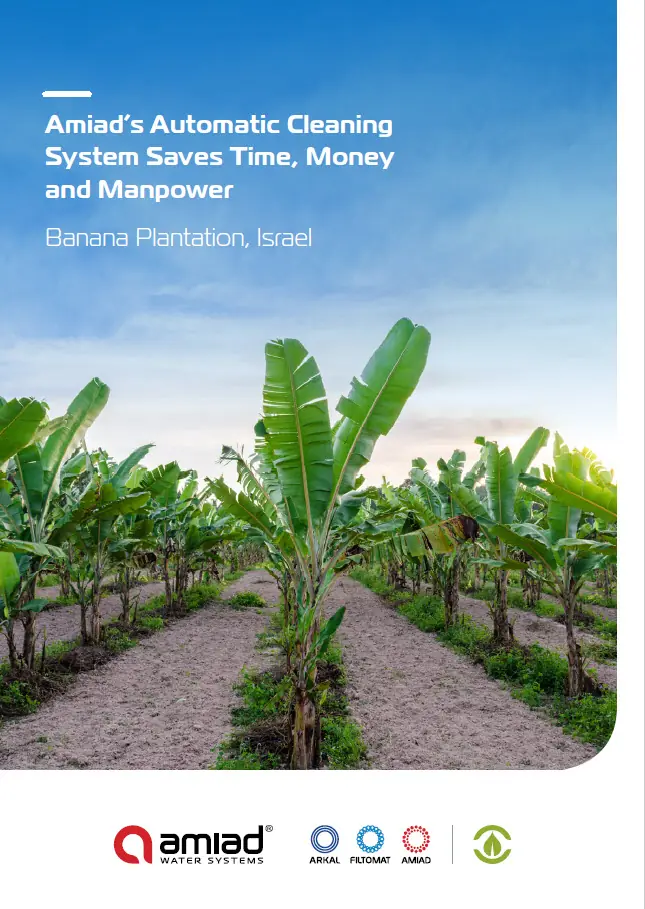
In this blog post, Kfir Atias explains the various steps of the screen filtration process – from beginning to end.
|
What You Will Learn:
|
Read on to learn more about why filtration is needed, the importance of filtration degree and other key points to consider when it’s time to select a screen filter for your irrigation system.
What is water filtration?
Filtration (particle filtration) separates and removes solids from water.

Why is water filtration a necessity?
Whether water is required for drinking, industrial processes or agricultural irrigation filter systems, it usually requires some degree of filtration. The type of filter selected depends on the water source (surface or sub-surface water) which have different characteristics and quality. While water quality can be analyzed according to its chemical, biological and physical characteristics, our focus is on the physical composition of the water as well as the type and quantity of the solids.
<<See the Mini Sigma’s step by step automatic filtration process. Download the infographic>>
Taking a look at the filtration spectrum, we see that water can contain salts, viruses, bacteria, helminth eggs, clay, silt, algae, sand and gravel.
To effectively cope with the wide range of materials that need to be filtered, Amiad has developed diverse filtration solutions:

Particle filtration is a statistical process: Due to elongated biological bodies and compressible particle materials, the filtration process is one of statistical probability. Particles larger than a certain size (according to the specific application) must be removed in order to protect the water systems and downstream processes and equipment.
Filtration of coarse and fine particles is mainly a process of mechanical filtration. During the filtration process steps, particles are retained on the filtration element by lodging on its solid parts and fully or partially covering the water passages.
The mechanism of filtration: What types of mechanical filtration are available?
Here are the three most popular types of fine particulate filters which have different size pores (measured in mm or micron):
• Surface filtration (screen filters)
• Depth filtration (media filter)
• Semi-depth filtration (disc filter)
What is the filtration degree and why is it important?

The degree of filtration required is defined by the irrigation system manufacturer to protect the system from damage.
The Nominal filtration degree is an actual linear dimension of the shortest straight-line distance (length or width) across an individual opening or pore of the filter medium.
The Absolute filtration degree is the length of the longest straight-line distance across an individual opening of the filter medium.
The effective filtration area is the total area of the filter medium which is exposed to flow and is usable for the filtration process. In surface filtration, particles larger than the pore size of the filtration medium are stopped at the upstream surface of the filter.
| Pro Tip: Track the differential pressure (DP) across your filter. Regular monitoring can help predict maintenance needs and optimize cleaning schedules, preventing system inefficiencies. |
How do you select the right screen filter to protect your irrigation filtration system?
There are two main criteria for choosing the correct irrigation filtration system from the many filter types available:
1. Efficiency in separation of particles larger than the filtration size during the water filtration process.
2. Simple and effective cleaning technology.
Example of before and after the filtration process with an Amiad screen filter

Amiad’s Screen Filtration Process:

Here are the filtration process steps outlining how filtration is done:
During the filtration process in water treatment, (1) raw water enters through the filter’s inlet, (2) first passing through the coarse screen for removal of large debris and sediment, (3) then through the inner fine screen for removal of the remaining smaller particles.
(4) A differential pressure switch (DPS) monitors the pressure caused by the accumulation of debris on the inner screen and initiates the self-cleaning process when the pressure changes. The buildup from the screen is then discharged.
(5) The flush valve opens to the atmosphere to create a strong suction force at the scanner nozzles, effectively removing dirt particles from the screen and discharging them from the filter.

(6) The forced backwash ensures powerful, efficient and complete cleaning of every point in the screen due to small nozzles with high velocity and suction forces. Efficient cleaning enables the filter to operate continuously without downtime. An efficient cleaning process cleans the screens, returning the DP to its original value.

(7) An efficient cleaning process cleans the media, thus returning the DP to its original value.

An inefficient cleaning leaves some of the solids on the filter’s screen, so the DP does not return to its initial value. With inefficient cleaning, clogging of the filter is inevitable.
|
Key Takeaways:
|
Watch the video of our innovative Mini Sigma screen filter, to see how we address the issues of accurate filtration degree and efficient cleaning ability.
FAQs
What is water filtration?
Solids are removed from water through a series of filtration process steps (particle filtration).
Why is the water filtration process needed?
Water is used in many different ways, such as for livestock drinking water and public drinking water, industrial processes or irrigation filter systems, and in most cases, it will need to be filtered to remove impurities and contaminants.
What types of mechanical filtration are available?
The most common types of mechanical filtration are:
- Screen filters for surface filtration
- Media filters for depth filtration
- Disc filters for semi-depth filtration
How do I select the right screen filter for my irrigation system?
Two main factors should be taken into consideration:
- Efficient particle filtration
- Simple and effective cleaning technology
Now you have the basics of how screen filters work and how they can help protect your irrigation system.
Do you still need more info?






